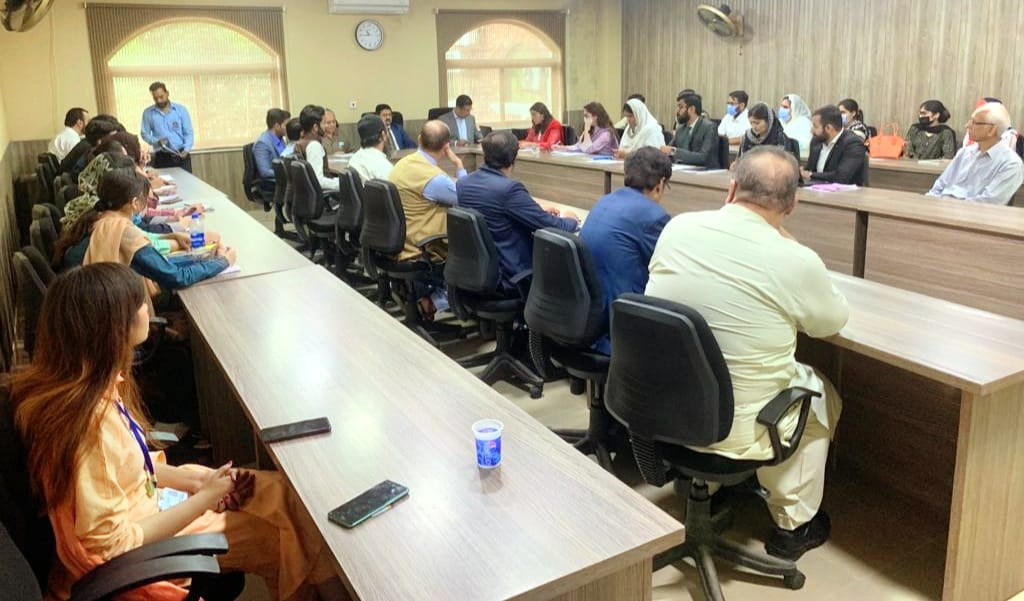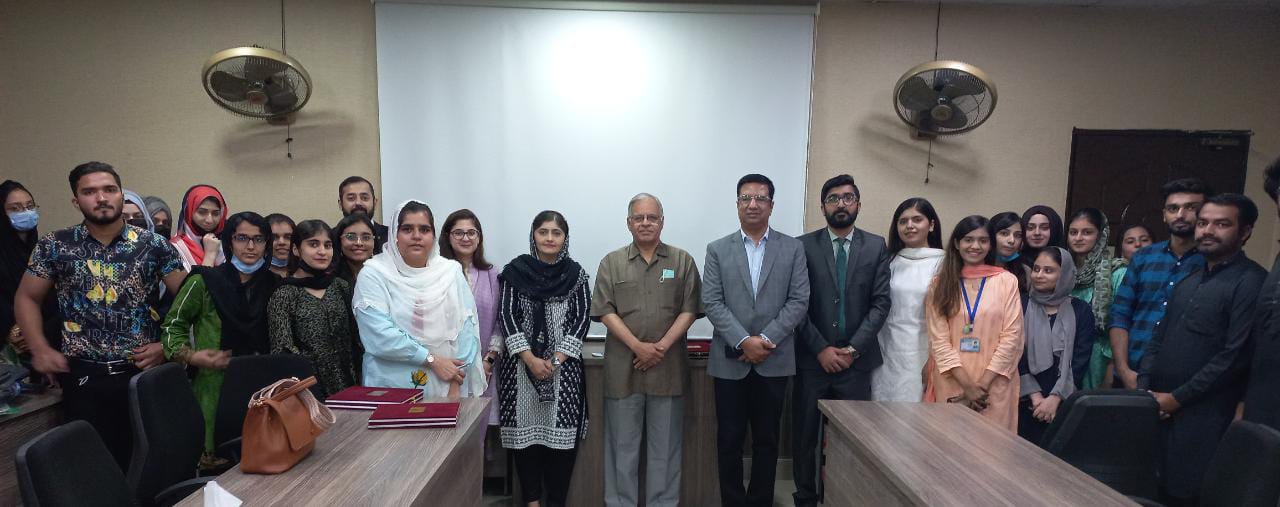Roundtable Discussion on “President Xi’s Vision: Changing World Dynamics and Shared Future” Organized by Pakistan Research Center for a Community with Shared Future, Communication University of China, Beijing & University of Sialkot, Sialkot

On 13th October 2021, a Roundtable Discussion on “President Xi’s Vision: Changing World Dynamics and Shared Future” was organized by Pakistan Research Center for a Community with Shared Future, Communication University of China, Beijing & University of Sialkot, Sialkot. The aim of the Roundtable Discussion was to bring together intellectuals from the partner institutions on one platform to share their expertise and knowledge on the Chinese concept “Community with Shared Future for Mankind” presented by President Xi Jinping.
The event commenced with the opening remarks of Brigadier Mansoor Saeed Sheikh (Retd), Vice-President (Punjab Region), Center for Global & Strategic Studies (CGSS), Islamabad. He stated that President Xi stresses the common ground between China and the West, including widely shared norms and international institutions. “A Community with Shared Future” is also the guiding principle of China’s international relations today. It underlies China’s strategic thoughts on long-term development of its bilateral ties with other countries. It is a manifestation of China’s foreign policy goal of peace, equality, development and win-win cooperation.
Prof. Dr. Saeed Ul Hassan Chishti, Vice-Chancellor, University of Sialkot, Sialkot in his welcome remarks discussed role of China, its goals and targets. He stated that China has a very clear dimension and direction towards development, cooperation and peace with Pakistan. Also, peace comes with economic stability. He stated that CPEC can be a game changer only if we are ready to train and educate our people. Prof. Dr. Saeed Ul Hassan Chishti, discussed about the collaboration between the University of Sialkot and Communication University of China (CUC). Furthermore, Communication University of China (CUC) is offering degrees and many more opportunities for the students for enhancement of diplomatic ties between the two countries. He was hopeful for more active collaboration between both institutions in coming years.
Mr. Khalid Taimur Akram, Director, Pakistan Research Center for a Community with Shared Future, Communication University of China, Beijing, China gave a detailed presentation on “Building a Community with Shared Future for Peace and Prosperity”.
He explained the objectives and goals of Pakistan Research Center for a Community with Shared Future jointly established by "The Institute of a Community with Shared Future (ICSF)" and "Communication University of China (CUC), Beijing". He stated that The Pakistan Research Center of a Community with Shared Future is a platform to support building an academic network and initiating collaborative academic projects.
Prof. Deqiang Ji, Vice-Dean, Institute for a Community with Shared Future (ICSF), Communication University of China (CUC), Beijing stated that now a days we can see the popularity in the notion of Community with Shared future where people are talking about the future of international diplomacy, how different countries can co-exist and co-prosper in the near future. Also, there is increase in scholarly understanding of the notion and notion is originally proposed by Chinese. He shared three points regarding three contexts in understanding the notion of the community of shared future. He mentioned about the financial and globalization crises of the west. The community with shared future aims to define and consolidate the way of thinking and how to work together for the globalization. Also, the world is need of some of new notions and it is necessary. He discussed about how to create a new notion, a new idea and how to work on it. He stated that from the Chinese prospect everyone gets benefited from globalization. Furthermore, the notion is not only for China and its better future but it is for all. He suggested that we must engage people of different languages and visions in the dialogues for a better globalization.
Prof. Hong Li, Director of the Center for BRICS Studies of the Communication University of China (CUC), Beijing presented speech on “Enhancing Regional Connectivity through the Global Concept of a Community with Shared Future”. She stated that in an equilibrium state, the mind is in the state of harmony. This equilibrium is the essence of all creatures, and this is the universal principle followed by all creatures. She discussed the China-Africa Environment Cooperation Center that provided training courses on weather technology for officials from African countries. She stated that China has donated a large amount of environmental protection equipment. She also discussed Paris in detail the climate pact.
Mr. Taimoor bin Tanveer, Lecturer, Department of International Relations, & Deputy Director, Placement & Alumini Affairs, University of Sialkot, Sialkot commenced his discussion with the historical background of dialogue of civilizations. He stated that Civilizations first appeared in Mesopotamia and later in Egypt. He talked about primary and secondary commonalities which includes reliable source of water, transportation and soil a primary whereas social structure, government and religion as secondary commonalities. He also mentioned importance of the Belt and Road initiative that how it is way to the economic integration, peace and prosperity and less conflicts. Also, he stated that dialogues are the need for sustainability and it is there is always a need to sustain the dialogue between radically different viewpoints as a guarantee of a level of diversity vital to unforeseeable responses to complex crises of the future.
Ms. Palwasha Nawaz, Deputy Director, Pakistan Research Center for a Community with Shared Future, Communication University of China, Beijing, China presented speech on “Working Towards an Inclusive World: Global concept of a Community with Shared Future”. She stated that concept of community with shared future emphasis multilateralism in politics, security, and development of civilizations, culture, academic domain, and environment. It also holds solidarity in all kind of problems which is faced by mankind. For example, pandemics, drugs, terrorism and climate change etc. Moreover, this idea can help the countries to curtail people to people gap. Understanding the potential of this narrative, it is safe to say that it is beneficial for every state. Working under this concept would allow states to develop mutual trust and work collectivity for prosperity of the world and inclusive economic development.
Dr. Tahira, Assistant Professor, Department of International Relations, University of Sialkot, Sialkot presented speech on Community with Shared Future: Foundation of the New World. She stated that the vision of shared future has profound and rich theoretical meaning. President Xi fully elaborated on the vision and layed emphasis on the need to form partnerships in which countries trade each other as equal fair and promote innovative and inclusive development. This approach depicts a bright future progress of international relations and represent a major innovation.
Mr. Hamza Jan, Lecturer Economics, Deputy Director, QEC, & Head of African Studies Center, University of Sialkot presented speech on “Significance of Community with Shared Future in Achieving Sustainable Development Goals”. He stated that in order to overcome the challenges which poor and developing countries face, there is a need for more integration, interconnectivity, inter-regional trade, and huge investment in social sectors and infrastructure to increase regional connectivity, social uplift, and increased overall welfare of the community of this very and only land for humanity under the umbrella of the vision for centuries, community with shared future.
Ms. Laraib Fatima Hassan, Communication & Coordination Executive, Pakistan Research Center for a Community with Shared Future presented speech on the topic “Community with Shared Future: A Catalyst for Achieving SDGs”. She stated that the idea of “Community with Shared Future for Mankind”, presented by President Xi in 2013, envisions a globalized world of sustainable peace, prosperity, security, and cooperation rather than a competitive world. In such a world, cooperation in different sectors supports handling the common global challenges. There are several global challenges that we are facing today and the idea of community with a shared future should be utilized to deal with these problems for our collective growth and development.






